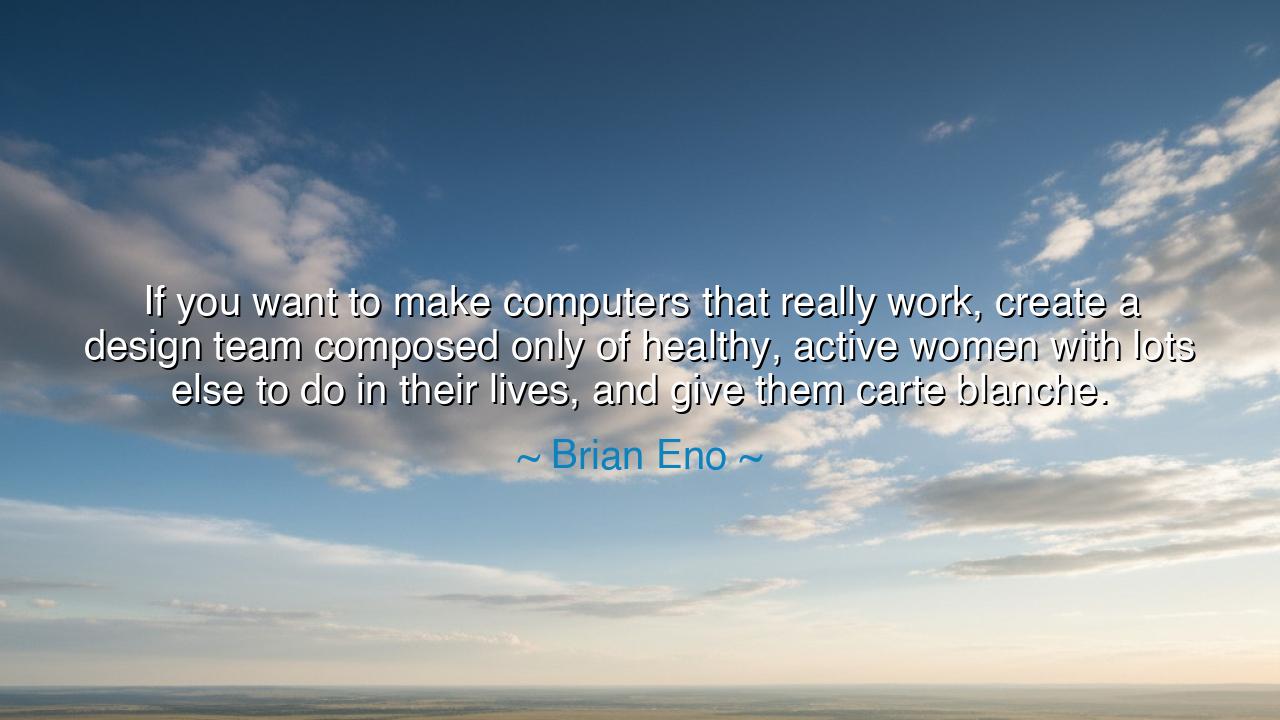
If you want to make computers that really work, create a design
If you want to make computers that really work, create a design team composed only of healthy, active women with lots else to do in their lives, and give them carte blanche.






In an age when machines hum like the heartbeat of civilization, when the cold logic of the computer shapes both the marketplace and the mind, the artist and visionary Brian Eno spoke with rare insight: “If you want to make computers that really work, create a design team composed only of healthy, active women with lots else to do in their lives, and give them carte blanche.” At first, these words seem playful, even provocative — but beneath them lies a profound truth about creation, balance, and the human spirit. Eno, a man who has long bridged the worlds of art and technology, reminds us that true design — whether of machines or of societies — must flow not from obsession or detachment, but from wholeness, from lives rooted in vitality and empathy.
The origin of this statement reflects Eno’s lifelong fascination with how systems — musical, social, or mechanical — come alive through diversity and constraint. Known for pioneering ambient music and for his work with David Bowie, U2, and Talking Heads, Eno was never content to worship the machine as a mere tool. He saw technology as a mirror of its makers. Thus, when he spoke of “computers that really work,” he was not speaking of faster processors or smarter algorithms, but of machines that serve human life, rather than consume it. His imagined team of “healthy, active women with lots else to do” is a poetic rebuke to the narrow, obsessive culture that often dominates the world of technology — a culture that prizes speed over sensitivity, efficiency over empathy, and function over meaning.
When Eno speaks of “healthy, active women,” he invokes the archetype of balance and wisdom — the life-giving force that harmonizes intellect with intuition, logic with care. In ancient philosophy, such balance was revered. The Greeks called it sophrosyne — the virtue of temperance, the harmony of body, mind, and soul. Eno’s words suggest that the best designers are not those buried in code day and night, but those who live fully: who walk in the sunlight, who nurture relationships, who understand the rhythms of the living world. To create technology that “really works,” one must first understand life that really works — and that understanding, he implies, flourishes more naturally in those who live beyond the machine’s glow.
There is a deeper cultural wisdom here, too — for Eno’s statement honors not only women, but the feminine principle itself, which in all ages has been the source of compassion, creativity, and connection. In ancient Egypt, Isis was the goddess of wisdom and restoration; in China, the concept of yin represented the receptive, nurturing force that sustains harmony in the universe. Eno’s imagined team of women, active and whole, represents this timeless balance: they would not build machines of conquest or control, but of grace, usability, and care — tools that serve life rather than dominate it. He is, in truth, calling for a restoration of harmony between technology and humanity, between creation and compassion.
History offers examples of this vision. Consider Ada Lovelace, the 19th-century mathematician who worked with Charles Babbage on the first concept of a programmable machine. She was not a mechanic or an engineer in the usual sense, but a poet’s daughter, a thinker who saw the unity between mathematics and art. Lovelace foresaw that computers could one day compose music, paint pictures, and aid the imagination — a vision ignored for a century by the men who came after her. She embodied precisely what Eno celebrates: a mind alive in many worlds, informed by health, curiosity, and a rich life beyond the laboratory.
When Eno says to give such creators “carte blanche,” he speaks of trust — the courage to release control and allow imagination to lead. The greatest innovations, he reminds us, are born not from rigid management or endless competition, but from environments where people are free to dream. Just as the Renaissance flourished when artists and scientists were liberated to explore, so too would technology flourish if its architects were trusted to create from a place of fullness, not fatigue. The “healthy, active” spirit is not a luxury — it is the wellspring of genius.
So, O listener, take this teaching to heart. Whether you build machines, write words, or raise families, remember that your work reflects your state of being. A creation born from exhaustion and obsession will mirror that same sterility; a creation born from vitality and compassion will breathe life into the world. Do not glorify the machine, nor worship efficiency. Walk, speak, rest, and live deeply, for in doing so, you bring balance to your craft. And if you lead others — in business, in art, or in invention — follow Eno’s wisdom: trust the whole human, not just the specialist.
The lesson of Brian Eno’s words is this: that the future of technology, and of civilization itself, depends not on greater speed or intelligence, but on greater humanity. The machines we build are reflections of us — our clarity, our chaos, our compassion. To make them truly work, we must first remember how to live. Let your life, then, be your first creation — active, healthy, whole — for from that soil alone will grow the kind of world where even the computers serve the heart.






AAdministratorAdministrator
Welcome, honored guests. Please leave a comment, we will respond soon